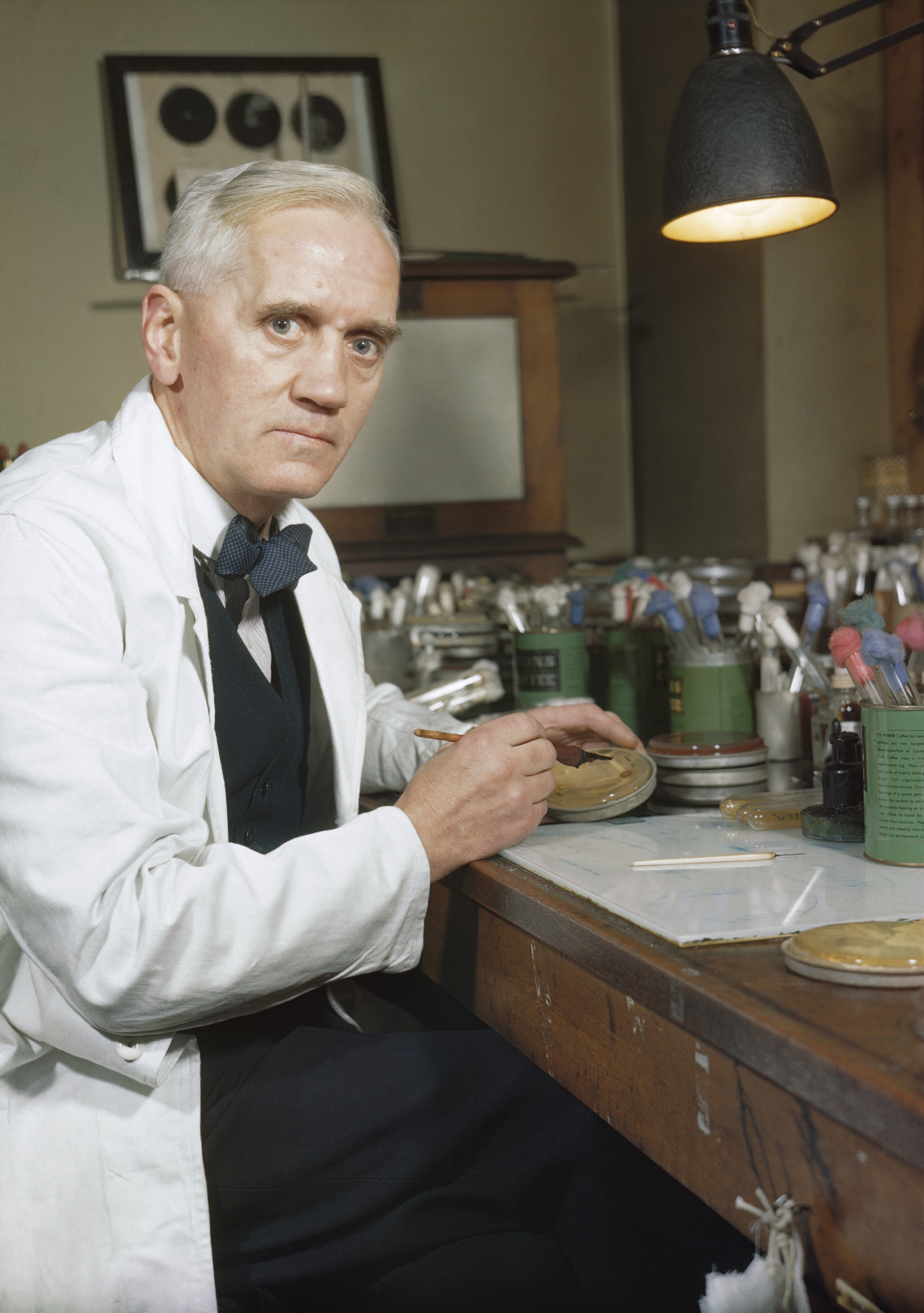
Alexander Fleming
Sir Alexander Fleming FRS FRSE FRCS[1] (6 August 1881 – 11 March 1955) was a Scottish physician and microbiologist, best known for discovering the world's first broadly effective antibiotic substance, which he named penicillin. His discovery in 1928 of what was later named benzylpenicillin (or penicillin G) from the mould Penicillium rubens has been described as the "single greatest victory ever achieved over disease".[3][4] For this discovery, he shared the Nobel Prize in Physiology or Medicine in 1945 with Howard Florey and Ernst Boris Chain.[5][6][7]
For other people named Alexander Fleming, see Alexander Fleming (disambiguation).
Alexander Fleming
6 August 1881
11 March 1955 (aged 73)
- FRS (1943)[1]
- Knight Bachelor (1944)
- Cameron Prize for Therapeutics of the University of Edinburgh (1945)
- Nobel Prize (1945)[2]
- FRSE
- FRCS(Eng)
He also discovered the enzyme lysozyme from his nasal discharge in 1922, and along with it a bacterium he named Micrococcus lysodeikticus, later renamed Micrococcus luteus.
Fleming was knighted for his scientific achievements in 1944.[8] In 1999, he was named in Time magazine's list of the 100 Most Important People of the 20th century. In 2002, he was chosen in the BBC's television poll for determining the 100 Greatest Britons, and in 2009, he was also voted third "greatest Scot" in an opinion poll conducted by STV, behind only Robert Burns and William Wallace.
Early life and education
Born on 6 August 1881 at Lochfield farm near Darvel, in Ayrshire, Scotland, Alexander Fleming was the third of four children of farmer Hugh Fleming (1816–1888) and Grace Stirling Morton (1848–1928), the daughter of a neighbouring farmer. Hugh Fleming had four surviving children from his first marriage. He was 59 at the time of his second marriage to Grace, and died when Alexander was seven.[9]
Fleming went to Loudoun Moor School and Darvel School, and earned a two-year scholarship to Kilmarnock Academy before moving to London, where he attended the Royal Polytechnic Institution.[10] After working in a shipping office for four years, the twenty-year-old Alexander Fleming inherited some money from an uncle, John Fleming. His elder brother, Tom, was already a physician and suggested to him that he should follow the same career, and so in 1903, the younger Alexander enrolled at St Mary's Hospital Medical School in Paddington (now part of Imperial College London); he qualified with an MBBS degree from the school with distinction in 1906.[9]
Fleming, who was a private in the London Scottish Regiment of the Volunteer Force from 1900[5] to 1914,[11] had been a member of the rifle club at the medical school. The captain of the club, wishing to retain Fleming in the team, suggested that he join the research department at St Mary's, where he became assistant bacteriologist to Sir Almroth Wright, a pioneer in vaccine therapy and immunology. In 1908, he gained a BSc degree with gold medal in Bacteriology, and became a lecturer at St Mary's until 1914.
Commissioned lieutenant in 1914 and promoted captain in 1917,[11] Fleming served throughout World War I in the Royal Army Medical Corps, and was Mentioned in Dispatches. He and many of his colleagues worked in battlefield hospitals at the Western Front in France. In 1918 he returned to St Mary's Hospital, where he was elected Professor of Bacteriology of the University of London in 1928. In 1951 he was elected the Rector of the University of Edinburgh for a term of three years.[9]
Death
On 11 March 1955, Fleming died at his home in London of a heart attack. His ashes are buried in St Paul's Cathedral.[2]
Myths
The Fleming myth
By 1942, penicillin, produced as pure compound, was still in short supply and not available for clinical use. When Fleming used the first few samples prepared by the Oxford team to treat Harry Lambert who had streptococcal meningitis,[3] the successful treatment was a major news, particularly popularised in The Times. Wright was surprised to discover that Fleming and the Oxford team were not mentioned, though Oxford was attributed as the source of the drug. Wright wrote to the editor of The Times, which eagerly interviewed Fleming, but Florey prohibited the Oxford team from seeking media coverage. As a consequence, only Fleming was widely publicised in the media,[94] which led to the misconception that he was entirely responsible for the discovery and development of the drug.[95] Fleming himself referred to this incident as "the Fleming myth."[96][97]
The Churchills
The popular story[98] of Winston Churchill's father paying for Fleming's education after Fleming's father saved young Winston from death is false.[95] According to the biography, Penicillin Man: Alexander Fleming and the Antibiotic Revolution by Kevin Brown, Alexander Fleming, in a letter[99] to his friend and colleague Andre Gratia,[100] described this as "A wondrous fable." Nor did he save Winston Churchill himself during World War II. Churchill was saved by Lord Moran, using sulphonamides, since he had no experience with penicillin, when Churchill fell ill in Carthage in Tunisia in 1943. The Daily Telegraph and The Morning Post on 21 December 1943 wrote that he had been saved by penicillin. He was saved by the new sulphonamide drug sulphapyridine, known at the time under the research code M&B 693, discovered and produced by May & Baker Ltd, Dagenham, Essex – a subsidiary of the French group Rhône-Poulenc. In a subsequent radio broadcast, Churchill referred to the new drug as "This admirable M&B".[101] It is highly probable that the correct information about the sulphonamide did not reach the newspapers because, since the original sulphonamide antibacterial, Prontosil, had been a discovery by the German laboratory Bayer, and as Britain was at war with Germany at the time, it was thought better to raise British morale by associating Churchill's cure with a British discovery, penicillin.
☆